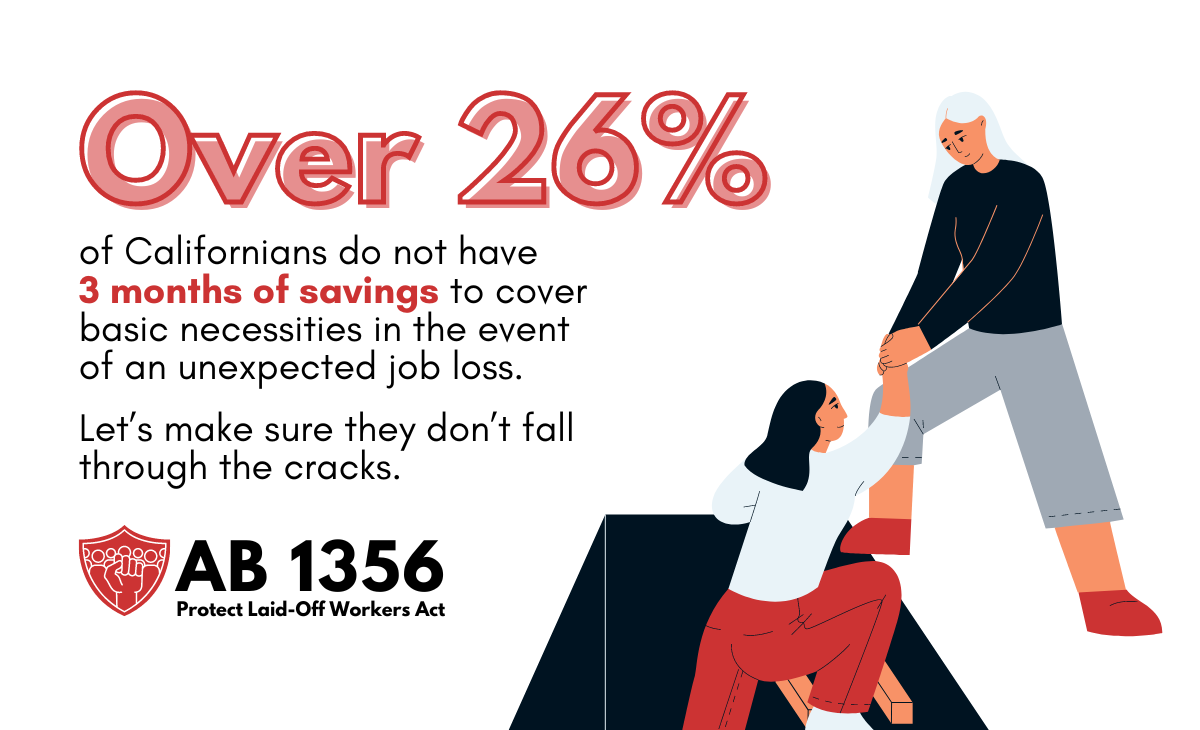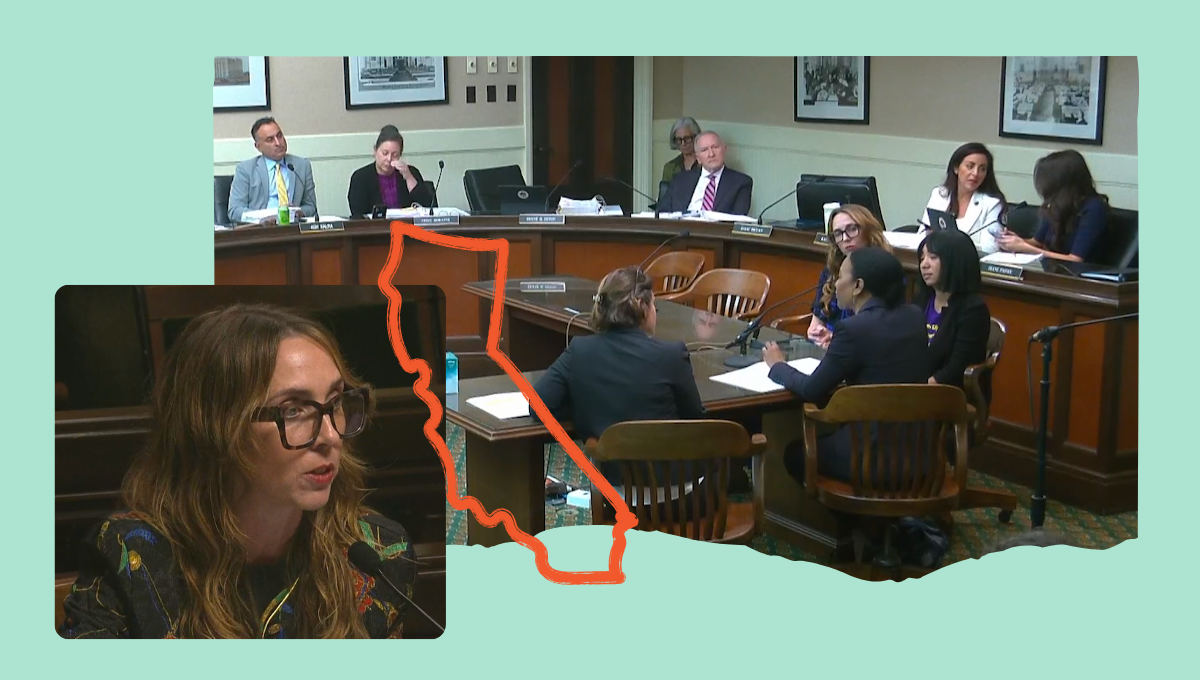What you need to know about the Protect Laid-Off Workers Act (AB 1356)

Late on Thursday night, November 3rd, 2022, thousands of workers found out that they may or may not have a job at Twitter that next morning. As the work day began on the east coast, a tidal wave of layoffs swept across the country, with thousands of workers in New York, then Chicago, then Denver, then San Francisco getting unceremoniously logged out of the system. Directly-hired workers either got an email with their new assignment or with a severance package. Contract workers like Melissa Ingle, on the other hand, got nothing.
Melissa Ingle was a Senior Data Scientist at Twitter. She worked on their political anti-misinformation team, trying to ensure that the midterms wouldn’t be swayed by nefarious bots and hoaxes. After directly-hired employees got the ominous email on Thursday, Melissa and the other contract workers frantically checked their inboxes for the same—but they never got that email.
For the next week, she tried to do her job, fighting misinformation in a pivotal election, not knowing if that day would be her last at the company. On Saturday, November 12th, Melissa was at the mall with her daughter and a friend. She got a notification on her phone that said “one or more of your access tokens have been revoked.” She tried to open her Twitter email, her Slack, and got a notice that said “no such user exists.” That’s how she was told that she was fired. Nobody explained anything to her, no email—she was just cut off.’
Stories like Melissa’s show us that we need real protections for workers in the event of a layoff and that everyone, contract and direct workers alike, is covered.
Introducing the Protect Laid-Off Workers Act, AB 1356!
That’s why Assemblymember Matt Haney (D-San Francisco) authored AB 1356, the Protect Laid-Off Workers Act to expand California’s WARN Act. The WARN Act is a federal and California law that provides workers 60 days notice in the event of a mass layoff. AB 1356 will expressly include contract workers who are impacted by a mass layoff at the company they are working for, extend the WARN Act notice requirement from 60 to 75 days, and ensure that workers’ rights under the WARN Act are not tied up in severance negotiations.
California already recognizes that workers need a safety net in the event of a layoff, which is why 20 years ago it expanded the federal WARN Act to include more workers. Since then, the economy and realities for workers have shifted dramatically—we need updated layoff protections to meet the needs of workers today. We need to:
- Increase the notice requirement to 90 days to reflect what other states like New York and New Jersey have already done to protect their workforce and to ensure that workers have protections when a company suddenly decides to lay off thousands of people in a day.
- Expand the protections to ensure that California’s 1.9 million (and growing) contract and temp workers can easily access these critical protections when impacted by a mass layoff.
- Decouple WARN notice pay from separation agreements so laid-off workers are guaranteed their rights without strings attached.
Update on Amendments
On July 11th, AB 1356 was heard in the Senate Judiciary Committee. The bill was voted out of committee and is moving forward; however, the Protect Laid-Off Workers coalition had to accept some amendments to get it through. The number of days of notice has been reduced from our proposed 90 days to 75 days. While we’re disappointed that California remains behind states like New York, New Jersey, and Maine, we’re still hopeful that this bill will help families in their transition when losing employment by providing two more weeks’ notice than current law.
The bill was also amended to require that contract workers have worked at least 60 hours on a job before becoming eligible for coverage under the bill. Currently, the default for contract workers is that they generally receive no WARN Act protections. While we’d like to see all contract workers get fair notice under any circumstances, we’re glad the bill is moving forward to ensure millions more workers get the protections they need in the face of mass layoffs.
How will AB 1356 help workers like Melissa?
In the past few years, the contract workforce has rapidly expanded to at least 1.9 million workers in California, but these workers aren’t always covered by the existing WARN Act and are already twice as likely to be paid poverty wages compared to workers in any other industry, according to NELP. These same workers are also disproportionately women, nonbinary, Black, Latinx, and Native. That means already vulnerable populations are getting left in the lurch with no warning and no protections. Layoff protections aren’t just an economic issue, it’s a gender and racial equity issue too.
Even for those who do qualify for the WARN Act, companies also often turn the notice requirements into ‘severance’ and include it in a separation agreement that asks laid-off workers to waive their legal rights.. That means that sometimes companies will use the benefits of the WARN Act to incentivize workers to sign a separation agreement that often includes terms like waiving their right to claims, nondisclosure, and nondisparagement—despite not being required to do so by law to receive the protections of the WARN Act.
Layoffs also have lasting negative impacts on workers’ health, well-being, and finances. These impacts are even more severe when a worker is already in a precarious position and when they receive no notice, severance, or compensation upon being laid off—like many contract workers.
Most Californians, though, live in some level of financial precarity. In the past 20 years, since the last update to California’s WARN Act, the affordability crisis has gotten worse, making it much more difficult for workers to absorb income shocks. 63% of Americans live paycheck to paycheck, and more than a quarter of Californians don’t have enough money saved to cover basic necessities for more than three months after an income shock like a job loss. By increasing the notice requirement from 60 days to 90 days, we can lessen negative impacts on the health, well-being, and finances of laid-off workers in our communities.
Ultimately, tech layoffs are the tip of the spear—not even tech jobs are safe from life-altering layoffs—we need to ensure that the most vulnerable workers in tech and beyond, are protected in the face of sudden precarity. By passing these protections now, we’re giving companies reasonable time to incorporate these new policies before a recession hits.
How can I stay updated about AB 1356?
We can’t let employers and their lobbyists speak on behalf of workers like Melissa. We’re working with grassroots organizations to ensure that all workers get the layoff protections they need—sign up to learn more!
Get updates on AB 1356
Learn more about the campaign to protect laid-off workers in real time.
Supporters
- Alphabet Workers Union-CWA (Sponsor)
- California Employment Lawyers Association (Sponsor)
- California Labor Federation (Sponsor)
- National Employment Law Project (Sponsor)
- National Legal Advocacy Network (Sponsor)
- TechEquity Collaborative (Sponsor)
- Temp Worker Justice (Sponsor)
- American Sustainable Business Network
- Asian Law Alliance
- Building the California Dream Alliance
- California Nurses Association
- Communications Workers of America District 9
- Equal Rights Advocates
- Indivisible CA: State Strong
- Legal Aid at Work
- National Council of Jewish Women Los Angeles
- Santa Clara County Wage Theft Coalition
- Stronger California
- CA State Council of Service Employees International
- Union (SEIU CA)
- Worksafe





